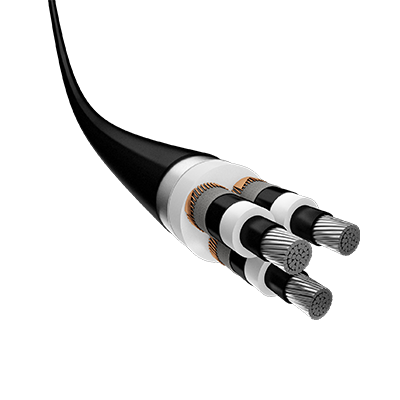
NA2XSEBY
General information
Standard: AZS 418-2010 (TS İEC 60502-2), TSE K 204 The Russian analogue: APvBV The cable is used for fixed installation in cable lines and industrial areas. The cables can be laid on dry ground, and have no restrictions on the level difference either. The cable does not spread combustion at single cabling.
Three-core XLPE insulated, steel tape armored, PVC sheathed high voltage cable with a an aluminum conductor
Structure:
- The conductor is aluminum (A), multi-wire compacted, round form, corresponds to class 2 of IEC 60228
- The cross-section of a multi-wire compacted round conductor is 25÷240 mm2
- The outer conductor screen is made of extruded semiconducting cross-linked polyethylene
3. Insulation is cross-linked polyethylene (2X)
4. Insulation screen is made of extruded semiconducting cross-linked polyethylene
5. The separation layer is made of semi-conductive water-blocking tape
6. The screen: each conductor is screened with copper wire and copper tape
Minimum cross-section of screen for cables with a conductor cross-section of 25-120 mm2 is 16 mm2
Minimum cross-section of screen for cables with a conductor cross-section of 150-240 mm2 is 25 mm2
The maximum cross-section of screen can be set based on the customer's request.
- Internal filler is polyvinyl chloride plastic
8. Armor is made of two zinced steel tapes (the upper layer tape is superimposed with the condition of covering the gaps between the turns
of the lower layer tape) (B)
9. The outer protective shell is made of PVC (Y)
Specifications:
- Operating conductor temperature: +90 0C
- The maximum heating temperature of the cable conductors in case of emergency: +130 0C
- The maximum heating temperature of the cable conductors in case of a short circuit: +250 0С
- The duration of a short circuit (not more than): 5 seconds
- Cable laying temperature (not less than) / -15 0С
- Ambient temperature: -50 / +50 0C
- Minimum bending radius of the cable: 15xD (D – outer diameter of the cable)
NOTE: Technical specifications are given in Table 8.




